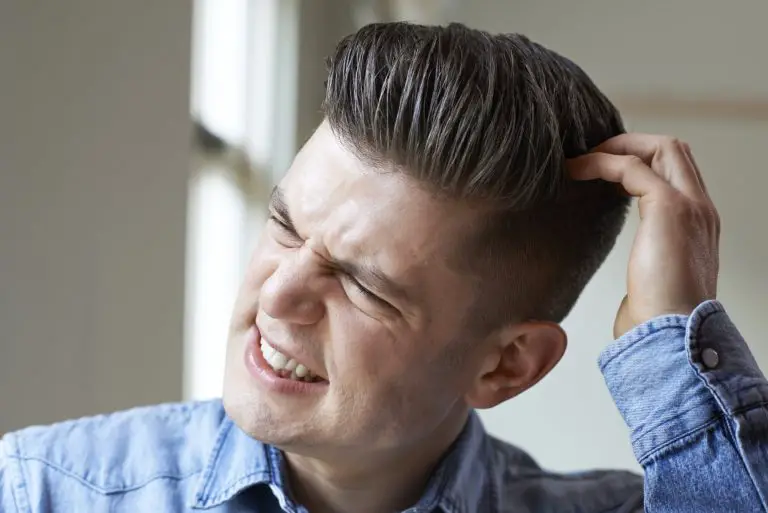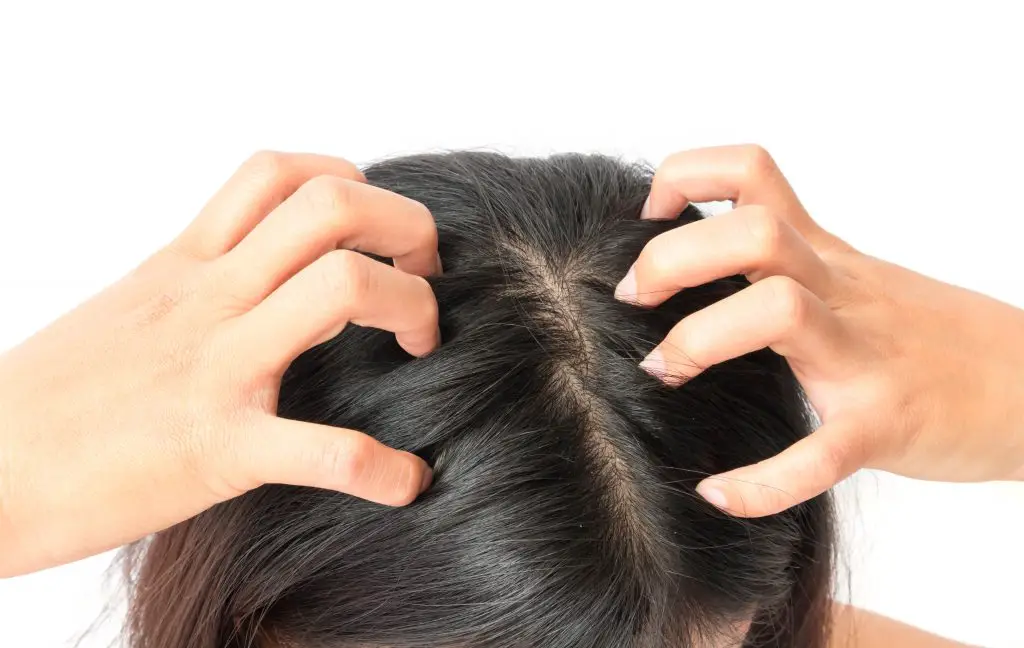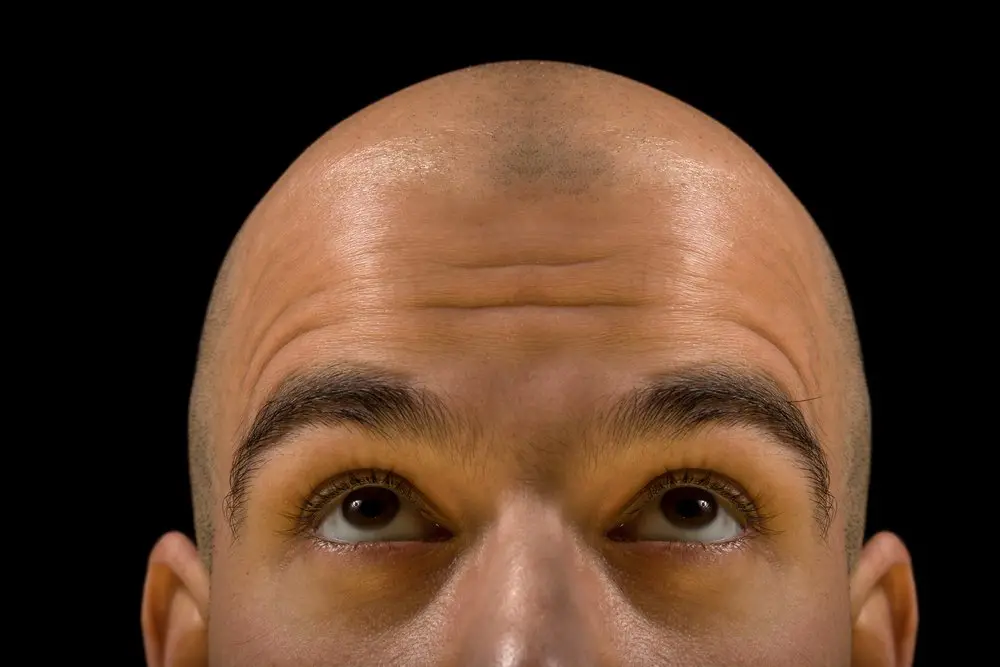
Page Contents
Scratching your head wondering about the connection between dandruff and hair loss? The good news is, dandruff isn’t the direct cause of hair loss. However, the bad news is you still have dandruff.
If you’re suffering from a case of the flakes, and noticing hair accumulating in the drain, there is a quick and easy fix: stop scratching! Constant itching leads to constant scratching, and erosion of the healthy dermis layers on the scalp’s surface. It’s imperative to keep the scalp clean and healthy, allowing the body’s sebaceous glands to excrete, sebum, an oil which lubricates and enriches the scalp and hair follicles. Healthy scalp equals healthy hair!
How to Handle Dandruff
The discovery of dandruff can be alarming. It’s important to identify the root of the issue causing the flakes as soon as possible. Seasonal changes in the weather, most notably in the winter when the temperature drops are extreme, wreaks havoc on the scalp. It’s when the air lacks the most moisture, meaning the skin is fighting extra hard to stay hydrated. During these colder months, beanies and hats are a constant head protector. Heat trapped inside winter head gear, raises the temperature of the skin, and tamps down the hair follicles. This only serves as a conduit to an even itchier, dryer scalp.
The skin is the largest organ on the body and demands a minimum of 50 ounces (about six 8-oz. glasses) of water a day. Well-hydrated skin is proven to combat skin irritation and inflammation.
Another unexpected case of dry scalp or sudden dandruff can be caused by a sensitivity or irritation to the skin cells when they come in contact and react to the ingredients in certain shampoos or hair products, including hair dye. This type of dandruff is known as a Contact Dermatitis, and the itching, drying and scaling is more prominent.
Remember, shampoo is a detergent, a formula designed to remove oils from your hair and scalp. If it isn’t causing sensitivity and irritation, it may be slowly working as a detriment to the scalp. The more contact with these oil-zapping culprits, the more the scalp suffers and the more dead skin cells accumulate. The scratching resumes, and once again, with too many dead skin cells concentrated on the scalp, hair is subject to falling out.
What Doctors Say about Dandruff
Clinically speaking, dandruff is a mystery. Many people who suffer with dandruff find it shameful. Dandruff can result in social and self-esteem problems. Combine the discovery and fear of hair loss, and the issue becomes larger, scarier, and more misunderstood.
One big misnomer about combating dandruff is to stop cleansing the hair and scalp entirely. Choosing to go shampoo-free allows the sebaceous glands to kick in and may help stabilize the scalp and hair pH balance. But, over time, without proper cleansing, pores become obstructed, and the skin and hair follicles become inflamed and damaged, leading to more itching, scratching, and potential hair loss.
The trick is to find a balance in daily cleansing routines; a shampoo or cleanser that works with the natural oils the scalp produces, without drying out the dermis and starting another cycle of built up dry, flaky cells.
Related Reading

How to Help Prevent Dandruff
When it comes to healthy scalp maintenance, an abundant selection of shampoos rich in emollients and essential oils are available to aid in deterring the formation of flaky skin cells and promoting healthy hair, root to tip!
Consider a tea tree oil-based shampoo, with its cooling, camphor-like quality, or an oat-meal based shampoo, packed with terrific anti-inflammatory properties. These are two of many excellent options to keep the scalp perfectly pH balanced and combat the dry out.
You can also grab a tub of coconut oil and give the scalp an all-over massage. A published study in 2015 indicated that coconut oil contains an anti-fungal property that when used on dry scalp activated much like ketoconazole, a key ingredient in many anti-dandruff shampoos.
Good nutrition is important for promoting healthy skin and hair too. Protein-rich foods like eggs, fish, sweet potatoes, avocados, and nuts contain vital polyunsaturated fats, which keep skin hydrated and plump. Eating is much more fun than scratching a dry scalp, and a delicious approach to banishing dandruff!
Don’t play the “Ignore It” game and let dandruff graduate to its more severe sister condition: Seborrheic dermatitis — reddened, inflamed and sore skin spots which appear greasy and scaly. When more surface area on the scalp is impacted, more hair follicles are impacted as well. When the itch is completely unbearable, and the scalp is inflamed or bleeding, dandruff isn’t the underlying problem. The skin cells may be under attack from Psoriasis or Alopecia, related to auto-immune disorders. If you think you suffer from Psoriasis, check out the best shampoo for psoriasis.
Seek medical treatment and talk with a dermatologist to diagnose and administer a prescription strength medication. Whether the skin is suffering from harsh treatments and stress or the body is attacking the hair follicles, these two skin diseases can start from a simple case of dandruff and should be taken seriously.
Whether treating dandruff as a measure of self-care or seeking professional medical guidance, the longer dandruff goes untreated, the more cyclical the scalp erodes and itches. Treat mild cases of dandruff regularly with specially medicated and formulated store bought shampoos to aid in cell reparation.
Remember, no matter the scalp irritation, never let the underlying problem persist as it can lead to irreversible damage. Permanent symptoms typically mean the hair may never grow back.
Conclusion
What’s especially disappointing is that there are no known cures for dandruff. The origin of dandruff is unclear, but it’s believed to be a combination of genetics and environmental factors. The one true fact known about dandruff is that it appears after a buildup of excessive skin cell growth on the scalp. And another fact is that to keep hair from falling out, combating the build up on the scalp’s surface stops the itching. And that, stops the scratching!
Tired of chasing down hair growth solutions without the results you’re after? Make sure you’re using the 3 hair loss products known to work before experimenting with alternative solutions. You may be surprised with how effective these 3 alone can be.






